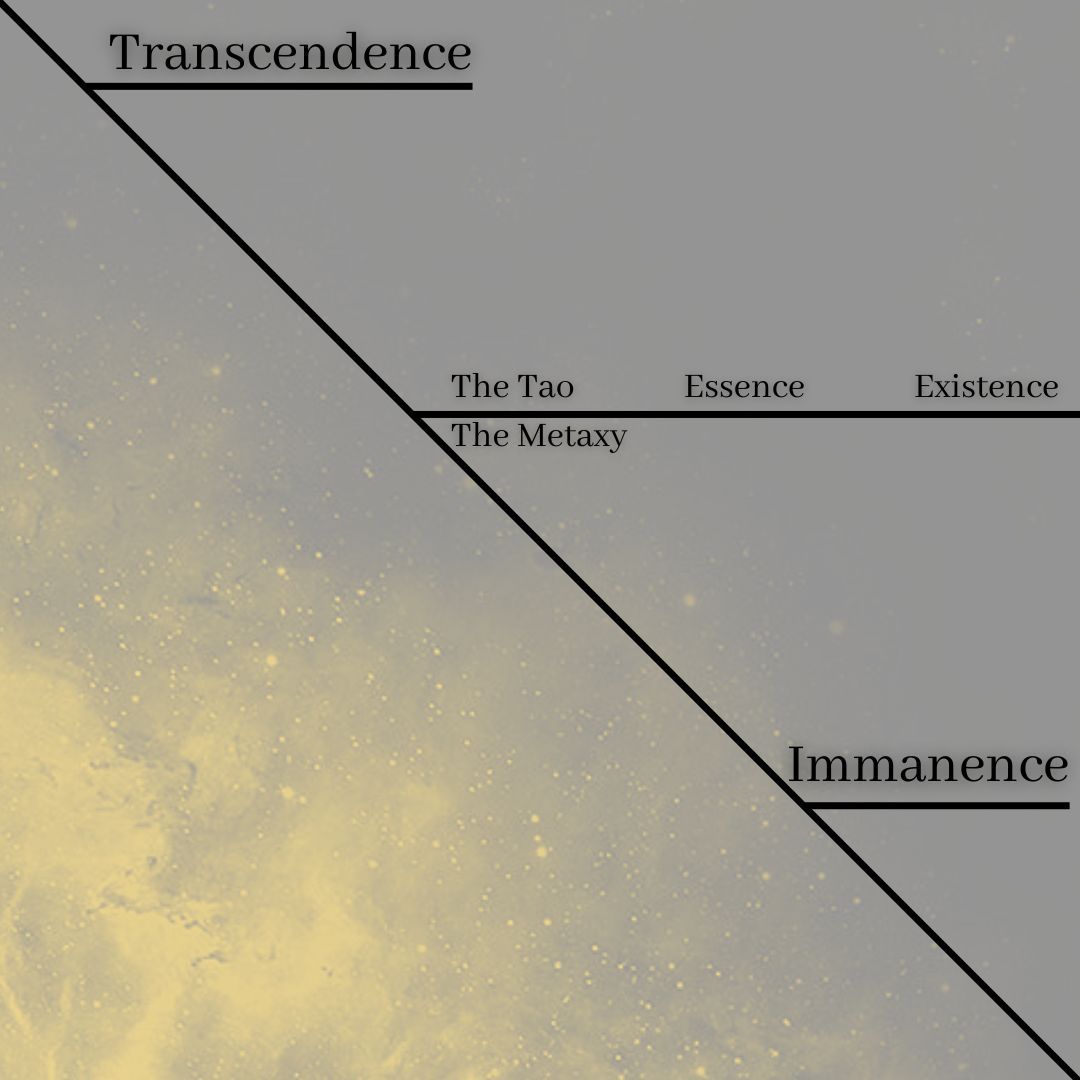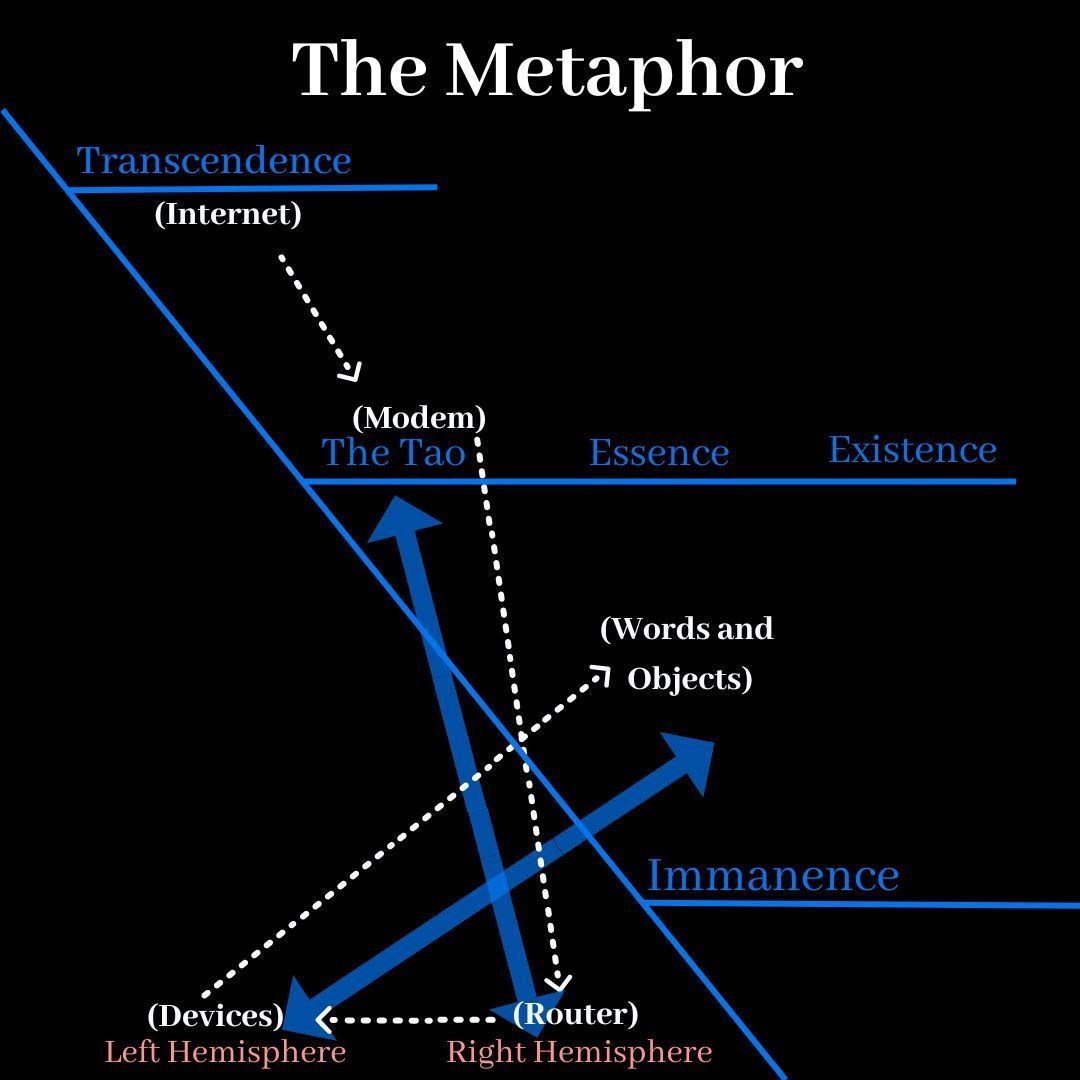Tao: The Transcendental Modem
For the fortunate few, that router is hard-wired with fiber optic. Most of us only get a wireless connection, and a wobbly one at that.

Brief Review: The Reality Spectrum
I’ve been writing about “The Reality Spectrum” throughout the “Existence Strikes Back” project. The Reality Spectrum is:
The Tao-->Essence-->Existence. You can click here for the full explanation.
Modernity is a rejection of the Tao part of the Spectrum (“The Great Rejection”). Folks with the modern mindset (think they) exist solely in the essence-->existence part.
Eric Voegelin’s Analysis Takes a Different Tact
But now I’m shifting into Eric Voegelin’s thought. He didn’t write about the Tao, essence, and existence and about how the rejection of the Tao has resulted in all sorts of modern problems.
Instead, he wrote about “transcendence,” the “metaxy,” and “immanence,” and how the rejection of transcendence has resulted in all sorts of modern problems (most notably, modern gnosticism, which will be a major focus in the coming months).
So, there’s The Tao-->Essence-->Existence.
And there’s Transcendence-->the Metaxy-->Immanence.
These terms aren’t synonymous. They’re intertwined, they’re related, they’re friends; they’re co-workers: but they’re not the same.
Here’s my attempt to diagram the relationship between the two, but please be aware that this diagram is probably more a product of my imagination than research, plus such an effort is very “un-Tao-like” and makes me wince a bit:

Transcendence: Heavenly
Immanence: Earthly
Metaxy: The Area Between Transcendence and Immanence
“Transcendence” and “immanence” are fundamental touchstones in Voegelin’s analysis.
Professor Eugene Webb, in Eric Voegelin: Philosopher of History, defines “immanent” quite simply: “Present within limited, mundane reality. The opposite of ‘transcendent.’”
It takes him a bit more effort to define “transcendent”:
Transcendent: From Latin transcendere: to go beyond, surpass. General term for that which extends or lies beyond some set of limits; may be relative (beyond some particular limits) or absolute (beyond all possible limits). The opposite of “immanent.” See also “the Beyond, “ground.”
“Beyond” is defined as “that which is ultimate and is itself indefinable because it surpasses all categories of understanding.” “Ground,” for Voegelin, is the “supreme, undefinable, transcendent reality” that positions us, or pulls and pushes us, between transcendence and immanence.
We exist in a thing Voegelin called “the metaxy.” It’s that reality in-between transcendence and immanence. Webb:
Metaxy: Between. Plato’s symbol representing the experience of human existence as ‘between’ lower and upper poles: man and the divine, imperfection and perfection, ignorance and knowledge, and so on. Equivalent to the symbol of ‘participation of being.’
It’s Not Really Complicated. It’s Just Frustrating.
When you jumble together all those terms from the diagram with all these further definitional matters, you get a mishmash of interweaving elements of reality, much of which cannot be defined.
The whole thing is, quite frankly, messy and, it’s important to note, frustrating. We don’t want messiness. We want certainty and definition. Descartes did. He wanted philosophy to be as certain as mathematics. That urge for certainty launched modernity and its core belief: that the Tao must be rejected because it is not certain.
My response: too bad.
Reality is what reality is. We want to be able to put it in a box, shake it up, and pour out a concoction that we can understand, but can’t. We can try, but then we get mystical formulations, like this one from the brilliant Sergius Bulkagov, writing about full reality as captured in the concept of the Holy Spirit:
But logical knowing, in and of itself, does not yet touch reality, because beyond or beneath the ideas of being there is this ‘difficult genus’ of Plato, this nothing which is also all. This nothing is mute but it exists; it does not have a name, but it receives all names. Sergius Bulgakov, The Comforter (Eerdmans), p. 344
Good luck mastering that.
But that doesn’t mean Bulgakov’s attempt to articulate ultimate reality is wrong.
It just means we can’t comprehend it all.
There is more than what we can grab, hold, know, and define. We have to accept it. After Aquinas got a full glimpse of reality toward the end of his life, he quit writing, telling his friend Reginald that everything he had written was mere straw compared to what he saw.
Everyone must accept it.
Many Reject it and Suffer from Nosos: Spiritual Disease
Or not.
The folks who choose not to accept it are folks who suffer from, another Voegelin term, nosos: spiritual disease, a disorder of consciousness. It takes many forms (discussed next week) but the fundamental trait common to them is a rejection of life in the metaxy.
Our existence in the metaxy is wonderful. It opens us to love and beauty: an existence greater than burrowing in the dirt and caring about nothing more than the next meal or orgasm. But at the same time, that dirt keeps us grounded and gives us a base from which we can appreciate the lovely and the beautiful without becoming a new-age spiritualist.
But life in the metaxy is also tense.
It stretches us between those two poles of existence: transcendence and immanence.
It kinda sucks.
And some people can’t take it, so they reject one of the two poles of existence: They either reject the immanent pole, wholly discrediting it as either illusory or the creation of an evil Demiurge, or they reject the transcendent pole, wholly dismissing it as either non-existent, illusory, or irrelevant to earthly affairs.
When I say “reject” or “dismiss,” it should be noted that those verbs can take many different forms. It could simply be “neglect” of the pole, maybe “ignorance” of or lack of appreciation for the pole, maybe making one pole wholly subservient to the other pole.
Regardless of the form, the important point to note is that the folks who suffer from nosos and act on it to foist their stilted consciousness (their deeply flawed view of reality) on others, either through social or intellectual action informed through knowledge (a “cognitive mastery of reality,” in the words of Eugene Webb), are “gnostics.”
Ancient gnostics rejected the immanent pole.
Modern gnostics reject the transcendent pole.
The Tao and Metaxy Intersect
You may have noticed that “the Tao” and “the metaxy” intersect in my diagram. That doesn’t mean they’re the same thing.
The metaxy is the world of existence. It’s where we live, think, and act. It’s where we exist while on earth.
The Tao is that nameless thing that underlies all reality. It encompasses transcendence, immanence, and the metaxy. It receives the transcendent signal, sends it into the metaxy, where it informs immanent affairs.
That’s why I say the Tao is “the transcendental modem.”
The saints and sages have a solid modem. They receive signals from transcendence and apply them through the right hemisphere to immanent affairs. Solon (one of Voegelin’s heroes) is a great example of this phenomenon, which is why I dedicated an entire essay to him.
When such men and women are recognized and followed, good things happen.
When such men and women are invisible or scorned, bad things happen.
Modernity is The Great Rejection: the rejection of the Tao.
Modernity, in other words, smashed the modem.
As a corollary, modernity has rejected leaders like Solon and embraced gnostic leaders like Lenin.
It has proven unfortunate, to put it mildly.
Other

